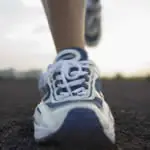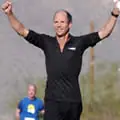
Ask several experienced runners about the running stores in your area. You want one that has a reputation for spending time with each customer to find a shoe that will best match the shape and function of the foot. Be prepared to spend at least 45 minutes in the store. Quality stores are often busy, and quality fitting takes time. Getting good advice can save your feet. An experienced running shoe staff can direct you toward shoes that give you a better fit, work better on your feet. I hear from runners about every week, who purchased a "great deal" but had to use it for mowing the lawn because it didn't work on their feet.
Bring with you the most worn pair of shoes you own—walking or running.
The pattern of wear on a well-used walking shoe offers dozens of clues to a running store staff person. Primarily, shoe wear reveals the way your foot rolls, which is the best indicator of how your foot functions. Shoes are made in categories, and each category is designed to support and enhance a type of patterns of the running motion.
A knowledgeable shoe store staff person can usually notice how your foot functions
?by watching you walk and run. This is a skill gained through the experience of fitting thousands of feet, and from comparing notes with other staff members who are even more experienced.
More: Ask the Experts: Running Gear
Give feedbackAs you work with the person in the store you need to give feedback as to how the shoe fits and feels. You want the shoe to protect your foot while usually allowing the foot to go through a natural running motion for you. Tell the staff person if there are pressure points or pains—or if it just doesn't feel right.
Reveal any injuries or foot problems
If you have had recent injuries or chronic joint issues (knee, hip, ankle) you may need a shoe that protects your foot from excess motion.
Even if your foot rolls excessively one way or the other, you don't necessarily need to get an over-controlling shoe if you don't have pain or injuries. The leg and foot makes many adjustments and adaptations which keep many runners injury-free—even when they have extreme motion.
Expensive shoes are often not the best for you
The most expensive shoes are usually not the best shoes for your feet. You cannot assume that high price will buy you extra protection or more miles. At the price of some of the shoes, you might expect that they would do the running for you. They won't.
Go by fit and not the size noted on the box of the shoe.
Most runners wear a running shoe that is about sizes larger than their street shoe. For example, I wear a size 10 street shoe but run in a size 12 running model. Be open to getting the best fit—regardless of what size you see on the running shoe box.
Extra room for your toes:
Your foot tends to swell during the day, so it's best to fit your shoes after noontime. Be sure to stand up in the shoe during the fitting process to measure how much extra room you have in the toe region of the shoe. Pay attention to the longest of your feet, and leave at least half an inch.
More: Mysteries of the Running Shoe Revealed
Width Issues- Running shoes tend to be a bit wider than street shoes.
- Usually, the lacing can "snug up" the difference, if your foot is a bit narrower.
- The shoe shouldn't be laced too tight around your foot because the foot swells during running and walking. On hot days, the average runner will move up one-half shoe size.
- In general, running shoes are designed to handle a certain amount of "looseness". But if you are getting blisters when wearing a loose shoe, snug the laces.
- Several shoe companies have some shoes in widths
- 1
- of
- 2
About the Author

Get ACTIVE on the Go


Couch to 5K®
The best way to get new runners off the couch and across the finish line of their first 5K.
Available for iOS | Android








Discuss This Article